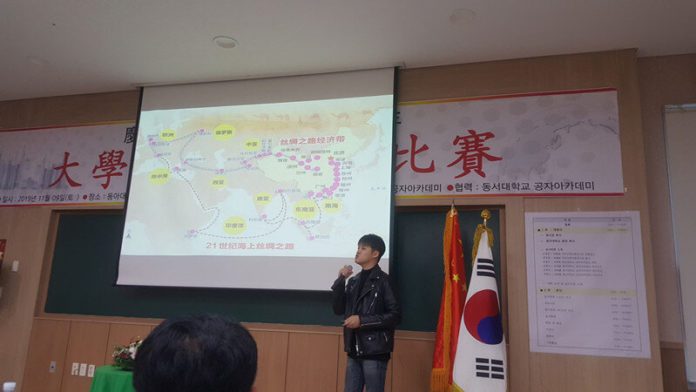
Confucius Institutes are established by the Chinese Communist Party to spread Chinese language and Chinese culture. However, they are also known to hammer home the official policy of the Communist Party of China, and sometime even conduct espionage operations under the direction of the Chinese government. South Korea originally served as a testing bed for the establishment of Confucius Institutes and now hosts 26 institutes across the country, the most in Asia. In addition to the presence of Confucius Institutes in popular tourist destinations like Gangnam, Seoul the Chinese government has also focused on the establishment of these institutes throughout the country, at both the university and high school level. In this article, we explore how Confucius Institutes, in major and local cities in South Korea, are penetrating and influencing the spirit and culture of South Koreans.

Confucius Institutes in Gyeongsang Province
Since the Joseon Dynasty, Andong, Gyeongsangbuk-do, South Korea has had a strong tradition of Confucianism thanks to its famous hometown Korean Confucian scholar, Yi Hwang (Toegye). The Communist Chinese Party is now leveraging this strong tradition to undermine the South Korean conservative stronghold region of former President Park Chung-hee. For reference, the forces that carried out the Korean anti-Japanese independence movement, during the Japanese colonial period, relied on China, and most of the Confucian scholars who were exiled overseas, were faithful successors of the Sinocentric view. Through the link between Confucius Institutes and Confucianism, China is naturally using the Andong region to strengthen its status and role as a great cultural power in Gyeongsang Province.
Andong University established its Confucius Institute in 2012. It also boasts the South Korea-China Confucian Cultural Center and the Andong Youth Chinese Language Center. The South Korea-China Confucian Cultural Center aims to spread Chinese culture by developing academic and cultural activities, utilizing the regional characteristics of northern Gyeongsangbuk-do and Shandong. The Confucius Institute of Andong National University runs multiple programs focused on Chinese language and culture. In particular, the Chinese Professional Workforce Program, includes the Andong Youth Chinese Language Education Center (elementary/secondary level), which focuses on teaching the Chinese language through the analects of Confucius and a short training course in China, were students enjoy a week-long culture experience program.
The Confucius Institute of Daegu Keimyung University, that is solely responsible for the Confucius Institute headquarters in Asia, is second in command only to mainland China. In 2017, the Confucius Institute of Daegu Keimyung University made agreements with 41 middle and high schools for Chinese language and cultural education. This “mutual cooperation” permitted Confucious Institute scholars unprecedented access to South Korea middle schools to deliver “Special Lectures on Understanding China.” Together at the direction of Beijing, the Confucius Institutes in Daegu operate as a cultural transmission gateway into South Korea.
Busan Region Confucius Institutes
The Confucius Institutes also have a strong political and economic presence in the Busan region. The opening ceremony of the Changwon Kyungil Academy Confucius Institute, in Busan, was attended by the President of the Changwon Kyungil Academy, a Busan City superintendent of education, the director of Geum Jung County, the director of Gyeongnam Education & Training Institute Consul General of China in Busan, and a Professor from Shandong University, China. In order to promote the understanding of China for middle school students in Daegu, the institute runs a program called, “Around the World China Talk” and more recently September 27 was designated the official day of the Confucius Institute.
On November 30, 2017, Kwak Boong, the Consul General of the CCP in Busan visited Dongseo University at the invitation of the university’s dean, Jang Je-kook, and gave a lecture on the “19th Chinese Communist Party Congress and the New Chinese Age of Foreign Policy.” Consul General Kwak explained the foreign policy of the New Chinese Age in detail, introducing the ruling ideology, experience, and characteristics of the Communist Party of China, combining the construction of the Human Destiny Community and the One Belt, One Road Initiative. He specifically focused on, “the introduction of China’s mobile payment system, 5G network, artificial intelligence, and shared economy, to active participants.”
Two years later, on May 31, 2019, the Dongseo University China Research Center co-hosted a discussion with the Consulate General of China in Busan entitled, “A New Opportunity for Cooperation between South Korea and China through the One Belt, One Road Initiative.” Researchers, professors, and public officials from the South Korea Maritime & Ocean University, South Korea Policy Contribution Institute, Busan Metropolitan City Office, Busan Economic Promotion Agency, and the BNK Southeast Area Research Center discussed avenues for increased cooperation and exchange with Chinese government officials in Busan.
Later in the year, on December 1, 2019, Consul General Kwak Boong spoke again to the leaders of the Busan region. But instead of cheerful talk about economic and cultural cooperation, he criticized South Korean students for their “active support of the young democratic Hong Kong protestors,” encouraging South Korean students “not to support Hong Kong.” He continued, “South Korean university students’ support for the Hong Kong rioters on campus only creates emotional confrontations between Chinese and South Korean university students. It will never be good for friendship between the two countries.” He closed saying, “terrorism and violence in Hong Kong for trampling the rule of law and social order – badly destroys Hong Kong’s prosperity and stability.”
Source:
http://busan.chineseconsulate.org/kor/xw/t1720548.htm
http://busan.chineseconsulate.org/kor/xw/t1720549.htm
http://kongzi.andong.ac.kr/board/index.php
https://www.kongzi.ac.kr/main.php
http://gongja.woosuk.ac.kr/2013/inner.php?sMenu=A4000
https://gongja.honam.ac.kr/sub.jsp?sID=0402
http://www.xn--ob0btg19m4mai66amijyvfn8ee7n9seuzx9za.com/main/index.html


